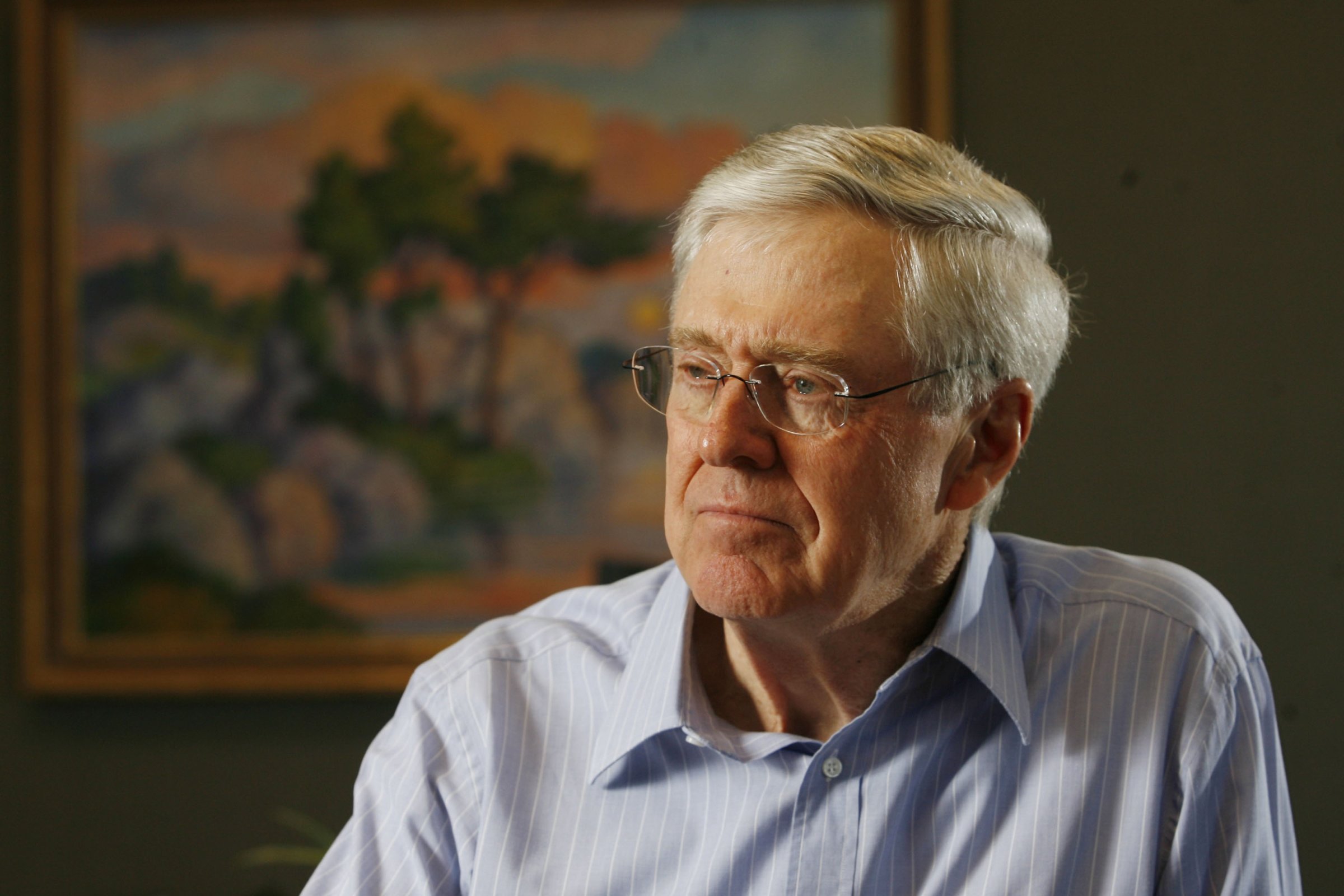
Charles Koch, the billionaire industrialist and Republican Party donor, says he will make criminal justice reform a major cause in 2015. “Over the next year, we are going to be pushing the issues key to this, which need a lot of work in this country,” Koch said in an interview with the Wichita Eagle.
Koch is a big spender—and something of a bogeyman among many liberals—so this made news. The “conservative mega-donor,” a Politico story blared, “is opening his wallet on an unexpected issue.”
Except it shouldn’t be unexpected. Koch is a libertarian, and libertarians have a history of opposing policies, such as mandatory minimum sentencing, that have made the U.S. incarceration rate the highest in the world. What’s perhaps more surprising is how Republican politicians from other parts of the spectrum are beginning to embrace criminal justice reform as well.
Over the past few years, GOP leaders in Washington and around the country have seized on justice reform as an issue that is both good policy and good politics. This view places them in conflict with many Republican voters, who still hew to the law-and-order beliefs on which the party had long been united. As a result, criminal-justice policy may emerge as one of the GOP’s key fault lines in 2015, as tensions simmer amid ongoing protests over police behavior and the presidential primary begins to heat up.
Virtually all of the likely 2016 Republican field supports some element of criminal-justice reform. Kentucky Sen. Rand Paul is the most visible and least surprising proponent; as a libertarian-leaning conservative, he has staked his candidacy on the idea that the GOP must adjust its policies as the composition of the electorate changes. But Paul is hardly the only 2016 hopeful to plant a flag on the issue. New Jersey Governor Chris Christie, a former federal prosecutor, has called for an end to the “failed war on drugs” and signed legislation that sent some offenders to rehab instead of prison.
Rick Perry, the conservative governor of Texas, has been among the nation’s top prison reformers, even winning a national award for his support of drug courts as an alternative to incarceration. Louisiana’s Bobby Jindal, another Republican governor eyeing a 2016 bid, pushed legislation that would boost the state’s drug rehab program and make some nonviolent offenders eligible for early release.
Conservatives in Congress also have an appetite for reform. Paul Ryan produced a white paper on poverty that includes proposals like giving judges sentencing flexibility for nonviolent offenders and letting some inmates earn time off their prison stays for successful participation in programs. Mike Lee, a Republican senator from Utah and a Tea Party favorite, was one of the original sponsors, with liberal senators Dick Durbin and Pat Leahy, of a bill called the Smarter Sentencing Act, which attempts to curtail the draconian sentencing that has left some 2.2 million Americans behind bars. Among the Republicans who have since signed on: Texas Sen. Ted Cruz, another presidential hopeful.
Why have Republicans come around on law-and-order issues? Part of it is politics. As the country grows younger and more diverse, GOP leaders grasp the need to reach out to the minority groups who are disproportionately affected by the excesses of the justice system. It’s no surprise that Ryan, who knows firsthand how a lack of minority support can erode the viability of the Republican presidential ticket, spent time touring inner cities after 2012—nor that Paul, who hopes to avoid the same fate in ’16, launched a listening tour of his own.
There is also, Republicans note, a conservative case for overhauling a bloated prison system that drains resources and divides families. “You want to talk about real conservative governance? Shut prisons down. Save that money,” Perry said. A group called Conservatives Concerned About the Death Penalty inveighs against the failures of capital punishment, a process riddled with “waste, inaccuracy and bias” that “does not square up with conservative ideology.”
But the GOP base—which is older and whiter and wealthier than the average America, and thus less likely to be ensnared by the system—has been slower to embrace these ideas. And the bitter national debate catalyzed by the recent deaths of black men like Michael Brown and Eric Garner looks likely to impede the process.
Police behavior is a different thing than, say, eliminating mandatory minimums for nonviolent offenders—a point on which even the majority of Republicans agree. But the debate has revealed the degree to which law-and-order attitudes dominate in Republican circles.
Polls reveal that perspectives on police behavior break along partisan lines almost as sharply as racial ones. If Republicans are less likely to accept the prevalence of police misconduct (and they are), it follows that they would be less likely to buy into the notion that the system requires reform. In a recent Washington Post-ABC News survey, eight in 10 white Republicans said the Brown and Garner cases were isolated incidents, and a similar percentage say they are “confident that police treat blacks and whites equally.”
As long as support for cops stays sacrosanct among primary voters, criminal-justice reform is unlikely to become a campaign rallying cry during the GOP primary, even in a field that predominantly supports it. The Republican Party is evolving on criminal justice. But politicians will still talk on the trail about what voters want to hear.
More Must-Reads from TIME
- Why Biden Dropped Out
- Ukraine’s Plan to Survive Trump
- The Rise of a New Kind of Parenting Guru
- The Chaos and Commotion of the RNC in Photos
- Why We All Have a Stake in Twisters’ Success
- 8 Eating Habits That Actually Improve Your Sleep
- Welcome to the Noah Lyles Olympics
- Get Our Paris Olympics Newsletter in Your Inbox
Write to Alex Altman at alex_altman@timemagazine.com